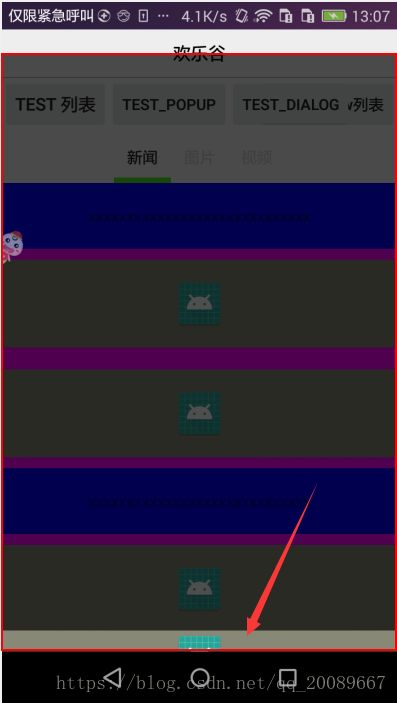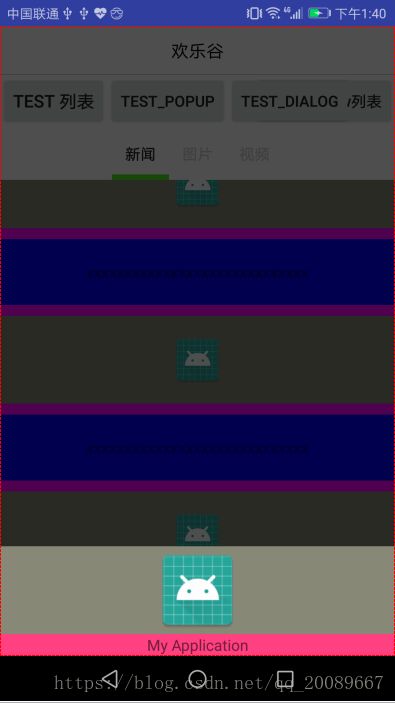关于popupWindow底部与导航栏( navigation bar)重叠,显示不全的问题分析
最近在做项目遇到个问题:自定义popupWindow,调用
public void showAtBottom(View parent) {
View view = mPopupLayout.findViewById(getContentViewId());
setAnimation(view);//自定义动画
showAtLocation(parent, Gravity.BOTTOM | Gravity.CENTER_HORIZONTAL, 0, 0);
}结果:
这个是测试demo里的效果。
看表面现象应该是系统的navigation bar遮挡住了popupWindow布局,怀着这个心思,自然想到popupWindow的setContentView设置布局方法。
以下是源码部分:
public void setContentView(View contentView) {
if (isShowing()) {
return;
}
mContentView = contentView;
if (mContext == null && mContentView != null) {
mContext = mContentView.getContext();
}
if (mWindowManager == null && mContentView != null) {
mWindowManager = (WindowManager) mContext.getSystemService(Context.WINDOW_SERVICE);
}
// Setting the default for attachedInDecor based on SDK version here
// instead of in the constructor since we might not have the context
// object in the constructor. We only want to set default here if the
// app hasn't already set the attachedInDecor.
if (mContext != null && !mAttachedInDecorSet) {//这个是会走的,源码就不分析了
// Attach popup window in decor frame of parent window by default for
// {@link Build.VERSION_CODES.LOLLIPOP_MR1} or greater. Keep current
// behavior of not attaching to decor frame for older SDKs.
setAttachedInDecor(mContext.getApplicationInfo().targetSdkVersion
>= Build.VERSION_CODES.LOLLIPOP_MR1);
}
}定位到最后一行:
setAttachedInDecor(mContext.getApplicationInfo().targetSdkVersion
>= Build.VERSION_CODES.LOLLIPOP_MR1);//api22sdk做了下api适配:
/**
* This will attach the popup window to the decor frame of the parent window to avoid
* overlaping with screen decorations like the navigation bar. Overrides the default behavior of
* the flag {@link WindowManager.LayoutParams#FLAG_LAYOUT_ATTACHED_IN_DECOR}.
*
*
By default the flag is set on SDK version {@link Build.VERSION_CODES#LOLLIPOP_MR1} or
* greater and cleared on lesser SDK versions.
*
* @param enabled true if the popup should be attached to the decor frame of its parent window.
*
* @see WindowManager.LayoutParams#FLAG_LAYOUT_ATTACHED_IN_DECOR
*/
public void setAttachedInDecor(boolean enabled) {
mAttachedInDecor = enabled;
mAttachedInDecorSet = true;
}
注释的大概意思是:这将把弹出窗口附加到其父窗体的装饰框(个人理解应该是类似于窗体的根布局decorview概念) 目的是避免popupWindow布局与屏幕装饰物重叠,比如导航栏。重写了默认的windowManager.LayoutParams为 FLAG_LAYOUT_ATTACHED_IN_DECOR
看下参数的含义:如果enabled为true那么就会避免与导航栏重叠
FLAG_LAYOUT_ATTACHED_IN_DECOR又是什么鬼?
/**
* Window flag: When requesting layout with an attached window, the attached window may
* overlap with the screen decorations of the parent window such as the navigation bar. By
* including this flag, the window manager will layout the attached window within the decor
* frame of the parent window such that it doesn't overlap with screen decorations.
*/
public static final int FLAG_LAYOUT_ATTACHED_IN_DECOR = 0x40000000;大体意思和上面的翻译吻合。原来如此,现在已经明确了
原来系统通过
setAttachedInDecor方法设置windowManager.Layoutparams,如果api>=22就设置为true,反之false
那setAttachedInDecor里的 mAttachedInDecor 字段在哪里生效的呢?继续看源码:
在PopupWindow里的computeFlags方法里:
if (mAttachedInDecor) {
curFlags |= WindowManager.LayoutParams.FLAG_LAYOUT_ATTACHED_IN_DECOR;
}与上面的翻译注释吻合。
下面是api=24,华为荣耀8的结果(显示正常):
现在的问题是我测试机api21,所以方法设置为false了。
更令人可恶的是setAttachedInDecor(boolean)方法只能api22以上调用
怎么办呢?
解决方案1:
1.将api<21的设备,popupWindow的布局上移导航栏的高度
代码:
@Override
protected void setAnimation(final View view) {
final int final_location;
if (view.getContext().getApplicationInfo().targetSdkVersion
< Build.VERSION_CODES.LOLLIPOP_MR1) {//api<22,这个地方就好比给sdk里打了个补丁
final_location = -ScreenUtils.getNavBarHeight(view.getContext());
} else {
final_location = 0;
}
view.post(new Runnable() {
@Override
public void run() {
int height = view.getHeight();
ValueAnimator animator = ObjectAnimator
.ofFloat(view, "translationY", height,final_location );//如果不需要动画,可以直接将布局上移这个高度
animator.setDuration(200).start();
}
});
}获取导航栏高度:
public static int getNavBarHeight(Context context) {
Resources resources = context.getResources();
int resourceId = resources.getIdentifier("navigation_bar_height", "dimen", "android");
if (resourceId > 0) {
return resources.getDimensionPixelSize(resourceId);
}
return 0;
}目前这种解决方案在真机都没问题,但是夜神模拟器比较特殊,夜神底下没有导航栏,但是获取的导航栏的高度却不是0,难道他获取的导航栏在右侧??
解决方案2:
在popupWindow的布局里添加个高度>=0的可滚动的列表(比如ListView,RecyclerView,ScrollView),如果不需要此控件,高度可设置为0
顺便贴下basePopupWindow的代码:
public abstract class BasePopupWindow extends PopupWindow {
private View mPopupLayout;
private View.OnClickListener mListener;
protected List mBeans;
public BasePopupWindow(Context context, View.OnClickListener listener, List beans) {
super(context);
initView(context);
mBeans = beans;
mListener = listener;
}
private void initView(Context context) {
mPopupLayout = ((LayoutInflater) context.getSystemService(Context.LAYOUT_INFLATER_SERVICE)).inflate(getLayoutId(), null);
setContentView(mPopupLayout);
setWidth(ViewGroup.LayoutParams.MATCH_PARENT);
setHeight(ViewGroup.LayoutParams.MATCH_PARENT);
setFocusable(true);
ColorDrawable dw = new ColorDrawable(0xb0000000);
setBackgroundDrawable(dw);
mPopupLayout.setOnTouchListener(new View.OnTouchListener() {
@Override
public boolean onTouch(View v, final MotionEvent event) {
mPopupLayout.findViewById(getContentViewId()).post(new Runnable() {
@Override
public void run() {
int height = mPopupLayout.findViewById(getContentViewId()).getTop();
int y = (int) event.getY();
if (event.getAction() == MotionEvent.ACTION_UP) {
if (y < height) {
dismiss();
}
}
}
});
return true;
}
});
setData();
}
private View getView(int viewId) {
return mPopupLayout.findViewById(viewId);
}
/**
* 如果有必要-子类根据model返回的数据写逻辑
*
* @return
*/
protected BasePopupWindow setData() {
return this;
}
public BasePopupWindow setListener(int viewId) {
getView(viewId).setOnClickListener(mListener);
return this;
}
/**
* 位置-底部
*
* @param parent
*/
public void showAtBottom(View parent) {
View view = mPopupLayout.findViewById(getContentViewId());
setAnimation(view);
showAtLocation(parent, Gravity.BOTTOM | Gravity.CENTER_HORIZONTAL, 0, 0);
}
protected void setAnimation(View target) {
}
/**
* 点击不消失的content view
*
* @return
*/
protected abstract int getContentViewId();
protected abstract int getLayoutId();
动画写在继承他的子类里。

